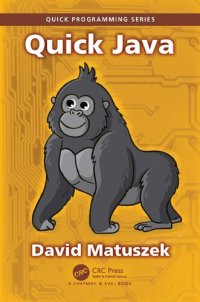
Ebook: Quick Java
Author: David Matuszek
- Genre: Computers // Programming: Programming Languages
- Year: 2023
- Publisher: CRC Press
- Language: English
- pdf
"We’ll be doing this next project in Java."
Unfortunately, you’re a C++ programmer, or maybe a Python programmer. How are you going to get up to speed in a hurry? There are lots of Java books for beginners, telling you all about what a computer is and how it represents everything in bits. You don’t need that. At the other extreme, there are thousand-page tomes that you aren’t going to get through in a few days, if ever. You need something in-between.
This book is intended to fill that gap. It’s written for the programmer who doesn’t need to be taught how to program, just how to do it in Java―and who needs to get started in a hurry.
Java is covered from the inside out. First, all the things that go inside a class, most of which are practically identical to C++. After that, all the various and complicated kinds of classes and interfaces and how they relate to each other in large-scale programs.
Testing is essential, so (unlike most Java books) JUnit is covered in detail. Then, in case you need to go in that direction, some functional programming, a little about parallel programming, and more than enough to get you started in building GUIs (graphical user interfaces) and doing animation.
If you are an experienced programmer, this book is your guide to getting up to speed in Java in a hurry. Not just the language, but also the basics of unit testing, graphical user interfaces, threads, animation, and functional programming.
If you are coming from one of the C languages, you will find most of the statement types familiar. These are clearly designated, so you can just skim over that material.
If you are coming from C++, you will find the object-oriented concepts are very similar, but the terminology is different.
If you are coming from another language, such as Python, there is very little you can skip. Sorry.
There’s a lot in this little book and, despite my best efforts, you won’t learn Java in a weekend. But it should be a good start.
Features:
Circular approach allows very fast entry into Java
Full description of JUnit testing
Summary of functional programming in Java
Introduction to synchronization and parallel processing
Extensive description of building GUIs
Unfortunately, you’re a C++ programmer, or maybe a Python programmer. How are you going to get up to speed in a hurry? There are lots of Java books for beginners, telling you all about what a computer is and how it represents everything in bits. You don’t need that. At the other extreme, there are thousand-page tomes that you aren’t going to get through in a few days, if ever. You need something in-between.
This book is intended to fill that gap. It’s written for the programmer who doesn’t need to be taught how to program, just how to do it in Java―and who needs to get started in a hurry.
Java is covered from the inside out. First, all the things that go inside a class, most of which are practically identical to C++. After that, all the various and complicated kinds of classes and interfaces and how they relate to each other in large-scale programs.
Testing is essential, so (unlike most Java books) JUnit is covered in detail. Then, in case you need to go in that direction, some functional programming, a little about parallel programming, and more than enough to get you started in building GUIs (graphical user interfaces) and doing animation.
If you are an experienced programmer, this book is your guide to getting up to speed in Java in a hurry. Not just the language, but also the basics of unit testing, graphical user interfaces, threads, animation, and functional programming.
If you are coming from one of the C languages, you will find most of the statement types familiar. These are clearly designated, so you can just skim over that material.
If you are coming from C++, you will find the object-oriented concepts are very similar, but the terminology is different.
If you are coming from another language, such as Python, there is very little you can skip. Sorry.
There’s a lot in this little book and, despite my best efforts, you won’t learn Java in a weekend. But it should be a good start.
Features:
Circular approach allows very fast entry into Java
Full description of JUnit testing
Summary of functional programming in Java
Introduction to synchronization and parallel processing
Extensive description of building GUIs
Download the book Quick Java for free or read online
Continue reading on any device:

Last viewed books
Related books
{related-news}
Comments (0)